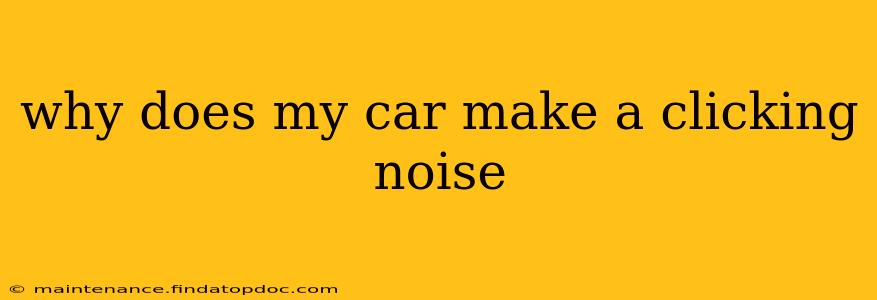A clicking noise in your car can be unnerving, but it's crucial to understand that many different components can be the culprit. Pinpointing the source requires careful observation and, in some cases, professional help. This guide will explore common causes of clicking noises in cars, helping you diagnose the problem and determine the next steps.
What Part of the Car is Making the Clicking Noise?
This is the most critical first step. Is the clicking coming from the engine, the wheels, the interior, or somewhere else? Knowing the location significantly narrows down the possibilities. For example, a click from the engine compartment is vastly different from a click emanating from a wheel well.
Is the Clicking Speed-Related?
Does the clicking speed change with the engine's RPM (revolutions per minute) or your vehicle's speed? This information is gold for diagnosis. Speed-related clicks often point to issues with the drivetrain, while engine-speed-related clicks frequently indicate engine problems.
Common Causes of Clicking Noises in Cars:
Engine-Related Clicking Noises:
- Low Engine Oil: A low oil level can cause parts to click together as they lack sufficient lubrication. Check your oil level immediately using the dipstick. Low oil can lead to serious engine damage if not addressed promptly.
- Worn-Out Timing Chain or Belt: These components are essential for engine timing. A clicking sound, especially at startup or while idling, could indicate wear and tear. Ignoring this issue can cause catastrophic engine failure.
- Lifters or Hydraulic Lash Adjusters: These small components regulate valve clearance. A clicking sound, often increasing with engine temperature, might point to faulty lifters needing replacement.
- Spark Plugs: Worn or damaged spark plugs can misfire, creating clicking or ticking noises.
- Exhaust System: A loose heat shield or exhaust component can produce a metallic clicking sound, especially when driving over uneven surfaces.
Drivetrain-Related Clicking Noises:
- CV Joints (Constant Velocity Joints): These are critical components in the drivetrain, particularly in front-wheel-drive cars. A clicking sound, often more pronounced when turning, strongly suggests a failing CV joint.
- Wheel Bearings: Worn wheel bearings produce a clicking or humming noise that usually increases with speed. This is a safety concern as a failed wheel bearing can cause a wheel to seize.
- U-Joints (Universal Joints): Found in vehicles with a rear-wheel-drive or four-wheel-drive system, these joints connect the driveshaft to the axles. A clicking sound, particularly when accelerating or decelerating, might indicate wear and tear.
Other Potential Sources of Clicking Noises:
- Power Steering Pump: A failing power steering pump can make a clicking sound.
- Alternator: A failing or worn alternator belt can click.
- Relays: Electrical relays controlling various functions can click intermittently if they are failing.
- Interior Components: A loose object rattling or clicking inside the car's cabin, such as in the glove compartment or under the seats, will create a noticeable sound.
H2: How Often Does the Clicking Happen?
Is the clicking noise constant, intermittent, or only occurring under specific conditions? This detail is essential. A constant click suggests a more serious problem than an intermittent click.
H2: When Did the Clicking Noise Start?
Did the clicking noise begin suddenly, or did it gradually worsen over time? A sudden onset suggests a more abrupt failure, whereas a gradual worsening might indicate a component wearing out.
H2: What Should I Do if I Hear a Clicking Noise in My Car?
Do not ignore a clicking noise in your car. Schedule an inspection with a qualified mechanic as soon as possible. Driving with a malfunctioning component can lead to more extensive damage and potentially dangerous situations. The mechanic can diagnose the precise cause of the clicking noise and recommend the appropriate repairs.
This guide provides a starting point for investigating clicking noises in your car. However, it's crucial to remember that diagnosing mechanical issues requires expertise and potentially specialized tools. Always consult a qualified mechanic for proper diagnosis and repair. Ignoring the problem could lead to significant mechanical issues and costly repairs later on.
